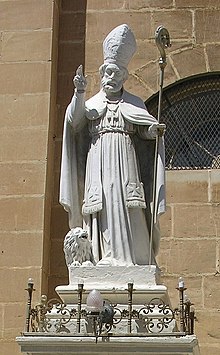Publius | |
|---|---|
 | |
| Bishop of Athens Bishop of Malta | |
| Died | c. 112;[note 1] or c. 125;[2] or c. 161–180[3] Athens,[4] Achaea, Roman Empire |
| Venerated in | Roman Catholic Church Orthodox Church |
| Feast | 22 January[5] (Roman Catholic) 13 March[3] (Eastern Orthodox) |
| Attributes | Shown with a lion next to him |
| Patronage | Floriana, Malta |
Saint Publius (Maltese: San Publju; Greek: Πούπλιος) was a first-century Maltese Christian prelate. He is considered the first Bishop of Malta and one of the first Bishops of Athens.
Publius is Malta's first canonised saint, who is described in the Book of Acts as the 'chief' or prince of the island (Maltese: il-prinċep tal-gżira). According to Maltese Christian tradition, Publius' conversion led to Malta being the first Christian nation in the West.
His feast day is celebrated by the Catholic Church and the Orthodox Church, in which the traditions are related but the day of celebration differs.
According to Christian tradition, it was Publius who received Paul the Apostle during his shipwreck on the island as recounted in the Acts of the Apostles. According to the Acts of the Apostles, Paul cured Publius' dysentery-afflicted father.
Apart from being patron saint of Floriana, Publius is also one of the two patron saints of Malta beside Paul. He was martyred c. 125,[2] during the persecution of Emperor Hadrian.
His feast is celebrated on 22 January in the Roman Catholic Church, which places him as the successor of Dionysius the Areopagite, dating his martyrdom to c. 112.[note 2]
In the Eastern Orthodox Church, however, his feast day is observed on 13 March, and according to an epistle of Dionysius, Bishop of Corinth, he is placed as the successor of Narcissus of Athens, dating his martyrdom to the period of the persecution under Marcus Aurelius (r. 161–180).[3]